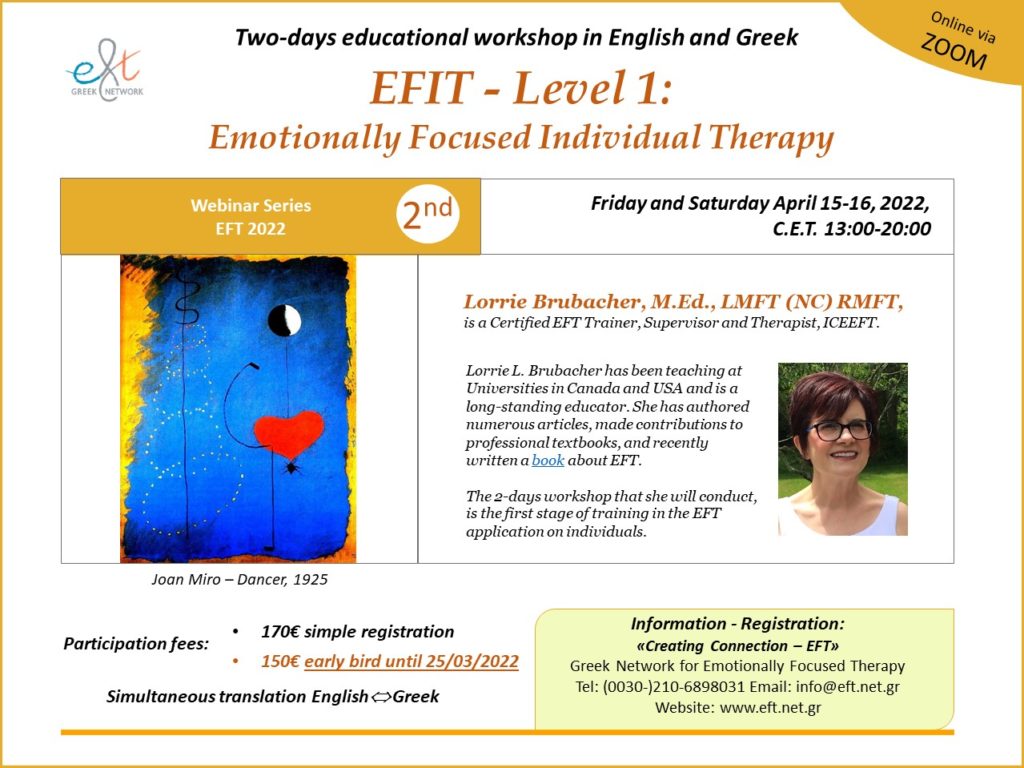
WORKSHOP DESCRIPTION
Emotionally Focused Individual Therapy (EFIT) is an attachment-based approach that extends Dr. Sue Johnson’s model of Emotionally Focused Couple Therapy (EFCT) to work with individuals. EFIT offers an integration of humanistic experiential interventions focused on reshaping intrapsychic experience and systemic interventions focused on reshaping patterns of engagement with significant others.
Emotion is given precedence because of its powerful role in structuring both inner experience and motivation and in shaping key patterns in relationships. Emotion links and organizes core experience and interaction. EFIT helps you to create corrective emotional experiences in individual therapy to shape safety and security with others and within self. This workshop will outline the theory and practice of EFIT, focusing on the primacy of emotion and the creation of a safe haven and a secure base alliance, core models of health and dysfunction from an attachment perspective including how within and between cycles interact and block growth and adaptation, a systematic sequence of interventions -the EFT Tango, as well as more micro-interventions, and how to stay with present processes in session to shape key change events. Didactic presentations will be accompanied by the viewing of EFIT sessions and experiential exercises.
PROGRAM OBJECTIVES
After this workshop, participants will be able to:
- Describe the key elements of the attachment, humanistic perspective on clients, problems, and clinical intervention,
- Identify clients’ within and between self-protective, self-defining repetitive patterns that create and maintain each other, block growth, and generate presenting problems that manifest as emotional disorders.
- Describe the core components of emotional disorders – depression and anxiety.
- Outline the EFIT process of change.
- Demonstrate the 5 moves of the EFT Tango to assemble core emotional experience, promote emotional balance and design corrective emotional experiences that expand the self and open engagement with others.
- Shape corrective emotional experiences to resolve impacts of trauma.
TARGET AUDIENCE
Mental Health Professionals, Social Workers, Psychologists, Students in these
professions
LEVEL
Beginning, Intermediate
Note that: You will benefit more from this training if you have completed the EFT Externship
Suggested readings
-2022 A Primer for Emotionally Focused Individual Therapy (EFIT), Johnson & Campbell
-2022 Becoming an EFT therapist – The Workbook, 2nd Edition
-Chapters 1 – 5 in (Johnson, 2019) Attachment Theory in Practice: Emotionally Focused Therapy with Individuals, Couples and Families.
-Chapter 12 on EFIT in (Brubacher, 2018) Emotionally Focused Couple Therapy: Key ingredients of change.
Upon registration you will also receive a link to relevant articles (available in English) you may read in advance of the training.
Participation fee: 170€
Until 25/03: Early Bird – 150€
Simultaneous translation: English <-> Greek
Information and registrations: info@eft.net.gr
To participate in this Webinar, it is necessary to fill out and send the confidentiality and agreement documents that will be requested upon registration.
Sorry, no records were found. Please adjust your search criteria and try again.
Sorry, unable to load the Maps API.
Lorrie L. Brubacher, M.Ed. LMFT (NC) RMFT, Certified EFT Trainer, ICEEFT
Lorrie Brubacher is a registered marriage and family therapist, with over 30 years of experience as an individual, couple and family therapist. She is an ICEEFT certified trainer with expertise in Emotionally Focused Therapy (EFT) which is one of the most researched and highly effective relationship counselling approaches.
Lorrie has been teaching in several universities in Canada and the United States. She provides consultation, supervision and training to individual, couple, and family therapists.
Lorrie has authored numerous peer reviewed journal articles, made contributions to professional textbooks, and wrote the popular book, 'Stepping into Emotionally Focused Couple Therapy: Key Ingredients of Change (Routledge, 2018).'




